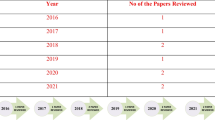Abstract
Online media platforms like Facebook, Twitter, and Instagram continue to influence our world. People today are more closely connected than ever before, and they exhibit such sophisticated personas. Ongoing studies have revealed a link between excessive social media use and depression. This research focuses on the development of features using Term frequency – Inverse Document Frequency (TF-IDF) and Bag-of-Word (Bow). The work will also put light on the generation of models utilizing a machine-learning technique. The dataset for this research using Twitter API. Only the English context was kept from the Tweets after filtration. It focuses on categorizing users’ mental health at the tweet level. About 20000 reviews make up this dataset. Using these reviews, emoji sentiment classification has been developed. Data is cleaned using a pre-processing approach before BoW and TF-IDF were used to extract features. Following to it, classifier deployment, training and assessment were carried out. Metrics for evaluation are used to gauge classifier accuracy. MultinomialNB (MNB) fared best in the field of Bag-of-words features among the three classifiers used to evaluate the accuracy, but Random Forest (RF) outperformed TF-IDF. In Bag-of-Words, we are able to classify data with an accuracy of 86% using TF-IDF Random Forest and 89% using multinomial NB and BoW.
Access this chapter
Tax calculation will be finalised at checkout
Purchases are for personal use only
Similar content being viewed by others
References
Nadeem, M., Horn, M., Coppersmith, G.: Identifying depression on Twitter (2016). arXiv arXiv:1607.0738
Reece, A.G., Reagan, A.J., Lix, K.L.M., Dodds, P.S., Danforth, C.M., Langer, E.J.: Forecasting the onset and course of mental illness with Twitter data. Sci. Rep. 7(1), 13006 (2017). https://doi.org/10.1038/s41598-017-12961-9
Katikalapudi, R., Chellappan, S., Montgomery, F., Wunsch, D., Lutzen, K.: Associating internet usage with depressive behavior among college students. IEEE Technol. Soc. Mag. 31(4), 73–80 (2012). https://doi.org/10.1109/MTS.2012.2225462
Choudhury, D.M., Kiciman, E., Dredze, M., Coppersmith, G., Kumar. M.: Discovering shifts to suicidal ideation from mental health content in social media. In: Proceedings of the SIGCHI, pp. 2098–2110 (2016). https://doi.org/10.1145/2858036.2858207.PMID:29082385
Leite, A., Ramires, A., Amorim, S., E Sousa, H.F.P., Vidal, D.G., Dinis, M.A.P.: Psychopathological symptoms and loneliness in adult internet users: a contemporary public health concern. Int. J. Environ. Res. Pub. Health 17, 856 (2020). https://doi.org/10.3390/ijerph17030856
Eichstaedt, J.C., et al.: Facebook language predicts depression in medical records. Proc. Nat. Acad. Sci. 115, 11203–11208 (2018). https://doi.org/10.1073/pnas.1802331115
O’Reilly, M., Dogra, N., Whiteman, N., Hughes, J., Eruyar, S., Reilly, P.: Is social media bad for mental health and wellbeing? Exploring the perspectives of adolescents. Clin. Child Psychol. Psychiatry 23(4), 601–613 (2018). https://doi.org/10.1177/1359104518775154
Riehm, K.E., et al.: Associations between time spent using social media and internalizing and externalizing problems among US youth. JAMA Psychiatry 76, 1266–1273 (2019). https://doi.org/10.1001/jamapsychiatry.2019
Keles, B., McCrae, N., Grealish A.: A systematic review: the influence of social media on depression, anxiety and psychological distress in adolescents. Int. J. Adolesc. Youth 25, 79–93 (2020). https://doi.org/10.1080/02673843.2019.1590851
Karim, F., Oyewande, A.A., Abdalla, L.F., Chaudhry, E.R., Khan, S.: Social media use and its connection to mental health: a systematic review. Cureus 12, e8627 (2020). https://doi.org/10.7759/cureus.8627
Carr, C.T., Hayes, R.A.: Social media: defining, developing, and divining. Atlantic J. Commun. 23, 46–65 (2015)
El Baradei, L., Kadry, M., Ahmed, G.: Governmental social media communication strategies during the COVID-19 pandemic: the case of Egypt. Int. J. Pub. Adm. 44, 907–919 (2021). https://doi.org/10.1080/01900692.2021.1915729
Odgers, C.L., Jensen, M.R.: Annual research review: adolescent mental health in the digital age: facts, fears, and future directions. J. Child Psychol. Psychiatry 61(3), 336–348 (2020). https://doi.org/10.1111/jcpp.13190
Seabrook, E.M., Kern, M.L., Rickard, N.S.: Social Networking sites, depression, and anxiety: a systematic review. JMIR Ment. Health 3, e50 (2016). https://doi.org/10.2196/mental.5842
Arias-de la Torre, J., et al.: Relationship between depression and the use of mobile technologies and social media among adolescents: umbrella review. J. Med. Internet Res. 22, e16388 (2020). https://doi.org/10.2196/16388
Vidal, C., Lhaksampa, T., Miller, L., Platt, R.: Social media use and depression in adolescents: a scoping review. Int. Rev. Psychiatry 32, 235–253 (2020). https://doi.org/10.1080/09540261
Hartanto, A., Quek, F., Tng, G., Yong, J.C.: Does social media use increase depressive symptoms? A reverse causation perspective. Front. Psychiatry 12, 641934 (2021). https://doi.org/10.3389/fps.2021.641934
Vashist, G., Jalia, M.: Emoticons & emojis based sentiment analysis: the last two decades! Int. J. Sci. Technol. Res. (IJSTR) 9(03), 366–371 (2020). ISSN 2277-8616
Kralj Novak, P., Smailović, J., Sluban, B., Mozetič, I.: Sentiment of emojis. PLoS ONE (2015). https://doi.org/10.1371/journal.pone.0144296
Bhardwaj, A., Narayan, Y., Vanraj, P., Dutta, M.: Sentiment analysis for Indian stock market prediction using Sensex and NIFTY. Procedia Comput. Sci. 70, 85–91 (2015)
Forman, G.: An experimental study of feature selection metrics for text categorization. J. Mach. Learn. Res. 3, 1289–1305 (2003)
Breiman, L.: Classification and Regression Trees. Routledge (2017)
Author information
Authors and Affiliations
Corresponding author
Editor information
Editors and Affiliations
Rights and permissions
Copyright information
© 2024 The Author(s), under exclusive license to Springer Nature Switzerland AG
About this paper
Cite this paper
Verma, P., Srivastava, R. (2024). Emoji Based Sentiment Classification Using Machine Learning Approach. In: Challa, R.K., et al. Artificial Intelligence of Things. ICAIoT 2023. Communications in Computer and Information Science, vol 1930. Springer, Cham. https://doi.org/10.1007/978-3-031-48781-1_15
Download citation
DOI: https://doi.org/10.1007/978-3-031-48781-1_15
Published:
Publisher Name: Springer, Cham
Print ISBN: 978-3-031-48780-4
Online ISBN: 978-3-031-48781-1
eBook Packages: Computer ScienceComputer Science (R0)




